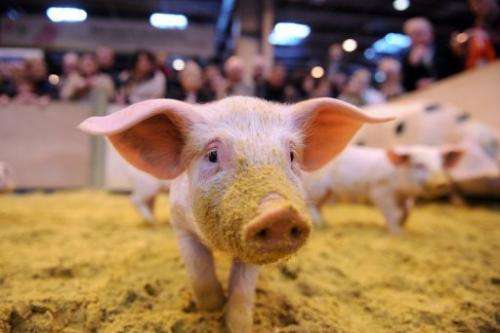Canada lab probes pig link to Ebola virus

Could pigs be an unexpected source for transmitting the deadly Ebola virus?
That is the question raised by a Canadian lab study, which says six piglets deliberately infected with Ebola passed the virus on to macaque monkeys housed in wire cages inside their pig pen.
All four monkeys caught the virus through indirect contact, according to the investigation carried out at the University of Manitoba in Winnipeg.
Further work is needed but the findings are worrying as macaques are close genetic relatives to humans, said the researchers.
Fruit bats are a known "reservoir," or bolthole, for the Ebola virus, and people have also contracted the disease after handling infected chimps, gorillas, gorillas, monkeys, forest antelope and porcupines.
But this research suggests that wild or domestic pigs could also be a natural host, said the study, published in the journal Scientific Reports.
And it strengthens suspicions that the pathogen can be transmitted by airborne droplets, in addition to contact with infected blood.
"Our findings support the hypothesis that airborne transmission may contribute to (Ebola) spread, specifically from pigs to primates, and may need to be considered in assessing transmission from animals to humans in general," said the paper.
Uganda's health minister said Thursday that a fresh Ebola outbreak has killed at least two people in the centre of the country, just weeks after an outbreak in western Uganda that claimed at least 17 lives was declared over.
In neighbouring Democratic Republic of Congo, an outbreak claimed 26 lives around the northeastern town of Isiro, some 350 kilometres (220 miles) from the Ugandan border, by late October.
Ebola is named after a small river in the Democratic Republic of Congo, then called Zaire, where it was first recorded 36 years ago.
It is a form of haemorrhagic fever, an African tropical disease that causes severe fever, muscle pain, weakness, vomiting and diarrhoea.
In some cases, it can trigger organ failure and unstoppable bleeding, killing a previously healthy adult within days.
It is one of the deadliest diseases known, killing two-thirds of the roughly 1,850 people who have been diagnosed with it.
Experts say this extreme virulence is its weak spot. The virus can be contained because it kills its victims faster than it can spread to new ones.
Pigs have previously been identified as carriers in outbreaks of novel flu viruses.
They can harbour avian influenza virus from wild birds or domestic fowl as well as flu virus from humans. The two viral strains then mix in the pig, which can pass on a new strain to farmworkers or slaughterhouse staff.
(c) 2012 AFP















